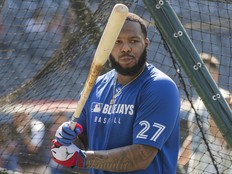SIMMONS: Why would Mitch Marner walk away from playing with Auston Matthews and Matthew Knies?
Could you imagine Mike Bossy deciding he didn’t want to play with Bryan Trottier and Clark Gillies anymore?

Article content
Mitch Marner has a rather basic choice to make.
Does he want to play the rest of his career on a line with Auston Matthews and Matthew Knies, or does he want to walk away from the Maple Leafs and take his chances elsewhere?
By the historic nature of free agency in hockey, more players, especially great ones, tend to stay with what they know rather than take a chance with what they do not.
But this situation is different because of the comfort involved and the discomfort Marner tends to attract and all the voices he regularly listens to.
Can you imagine Mike Bossy deciding he didn’t want to play with Bryan Trottier and Clark Gillies any longer?
Can you imagine Guy Lafleur deciding he didn’t want to play with Steve Shutt and Peter Mahovlich or Jacques Lemaire?
There aren’t that many great lines in hockey these days. There is no Phil Esposito centring Ken Hodge and Wayne Cashman, who played together for almost a decade.
There is no Wayne Gretzky between Jari Kurri and Esa Tikkanen on a team that already had Mark Messier and Glenn Anderson. There are no longer any goal-per-game lines such as Jean Ratelle centring Rod Gilbert and Vic Hadfield.
Coaches today tend to keep the same two players together out of comfort and then rotate the third player in and outs. But Leafs coach Craig Berube is fortunate here. He doesn’t have to alter the line.
It fits, the way great lines are supposed to fit. Marner is the playmaker and emerging scorer. Matthews is the scorer and the emerging playmaker. Knies crashes the crease, does the dirty work in the corners and has better hands than you might think, playing Cashman to Matthews’ Esposito.
A great line is made up of moving parts. Matthews, Marner and Knies all can kill penalties. They should all score 30 goals or more — and in Matthews’ case probably 50 or more most seasons.
They all, especially Matthews and Marner, can be excellent defensive players. They all should be — although not proven yet — more than competitive when it matters most.
At the end of this season, Marner is an unrestricted free agent and Knies is a restricted free agent. Knies should be signed before being left open for any kind of offer sheet.
And there’s another side for this, should the Leafs go quickly and quietly in the playoffs once again. The emergence of Knies as a front-line player who fits rather nicely alongside Matthews complicates the Marner decision just slightly.
The better Knies plays, the more easily you can say ‘so long’ to Marner. It’s kind of a teeter-totter effect here.
If the expectation is that this is just the beginning for Knies as a power forward of extreme talents, then the Leafs need to weigh what that is worth, will be worth against what Marner is worth on the other side of the teeter-totter.
It’s balancing the business — a sometimes nasty business. But should the Leafs or Marner decide a divorce is apparent, the team would then have to find a fit for that line and probably have $13- or $14-million in cap space to do so.
Marner, statistically, is irreplaceable. Over the past seven seasons, he has scored at a 98-point pace. But all you had to do was watch the Leafs in Florida the other night against the Panthers to understand how wonderful statistics can be, and how meaningless at precisely the same time.
Have the Leafs had a great, memorable line in the past? Not really. Mats Sundin never had a line worth remembering. Doug Gilmour played his best with Dave Andreychuk and rotating wingers, sometimes Wendel Clark.
Darryl Sittler had Lanny McDonald on his right and probably his best left winger was Errol Thompson.
Dave Keon won Stanley Cups in the six-team NHL with George Armstrong and different left wingers.
Matthews, Marner and Knies could be the super line for the Leafs that every team is looking for. Three players with three different skills sets.
This is just Knies’ second season as an NHL player. In one year, he has gone from 15 goals to 29 goals. From a middle-of-the-roster player to first line. From no power-play time to first unit deployment. From 35 points to 55 ,with four games to go.
It takes time for power forwards, for large men, to find their legs in the NHL. Usually more than two seasons.
Matthew Tkachuk needed three years to become a difference-maker. JT Miller took six years to find his place. And Tom Wilson is playing his best hockey at age 31.
Knies remains a work in progress, but what great progress he has made in his first two Toronto seasons.
There have been great lines in recent hockey history: Patrice Bergeron centring Brad Marchand and David Pastrnak is probably the best example. The best line currently has Brayden Point centring Nikita Kucherov and Jake Guentzel.
Those might not have been Bobby Clarke between Reggie Leach or Bill Barber; or Eric Lindros centring John Leclair and Mikael Renberg, but they were awfully sharp.
Imagine being Mitch Marner and choosing to walk away from Matthews and Knies. It reminds me of McLean Stevenson choosing to walk away from M*A*S*H.
You never get those decisions back. You never quite recover from them.
x.com/simmonssteve













Postmedia is committed to maintaining a lively but civil forum for discussion. Please keep comments relevant and respectful. Comments may take up to an hour to appear on the site. You will receive an email if there is a reply to your comment, an update to a thread you follow or if a user you follow comments. Visit our Community Guidelines for more information.